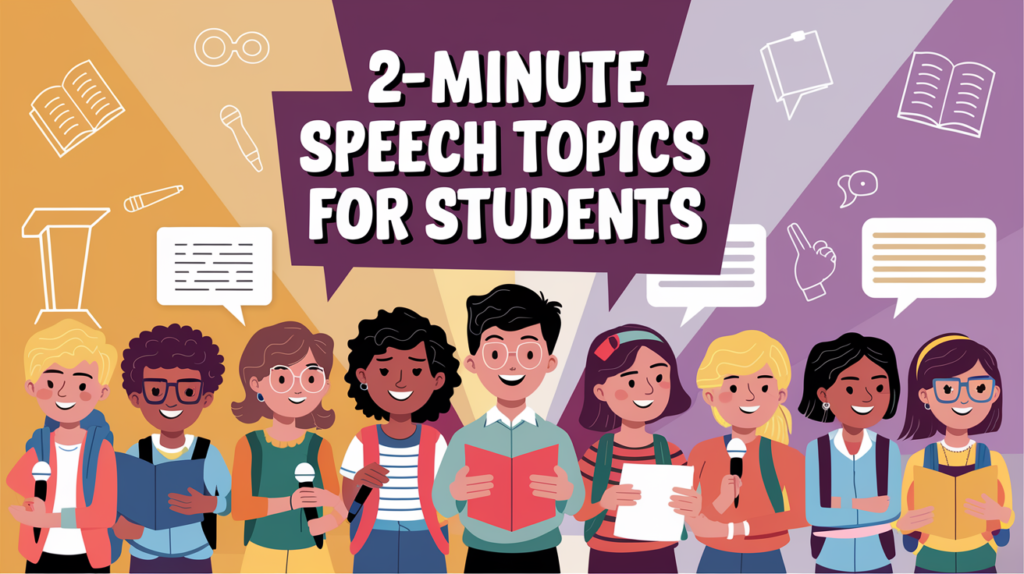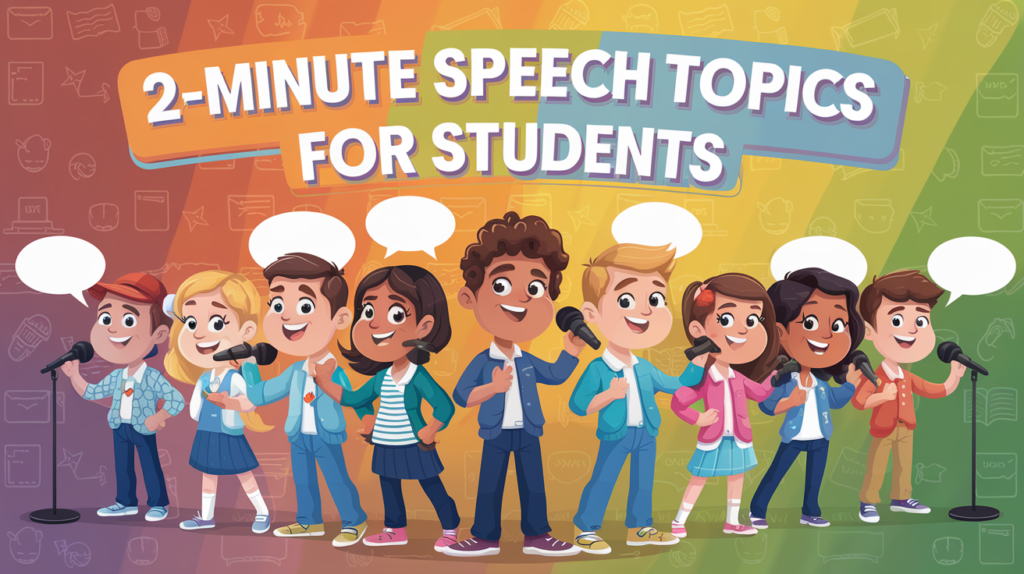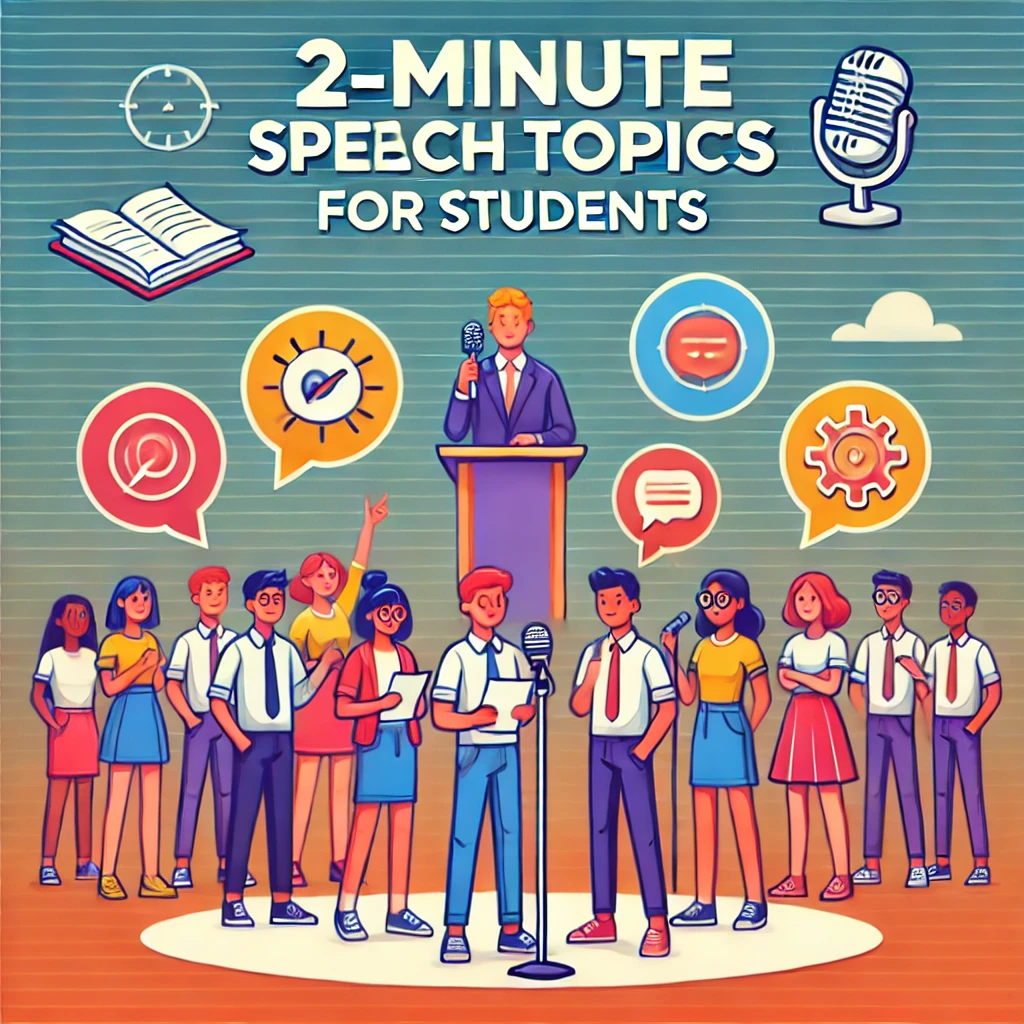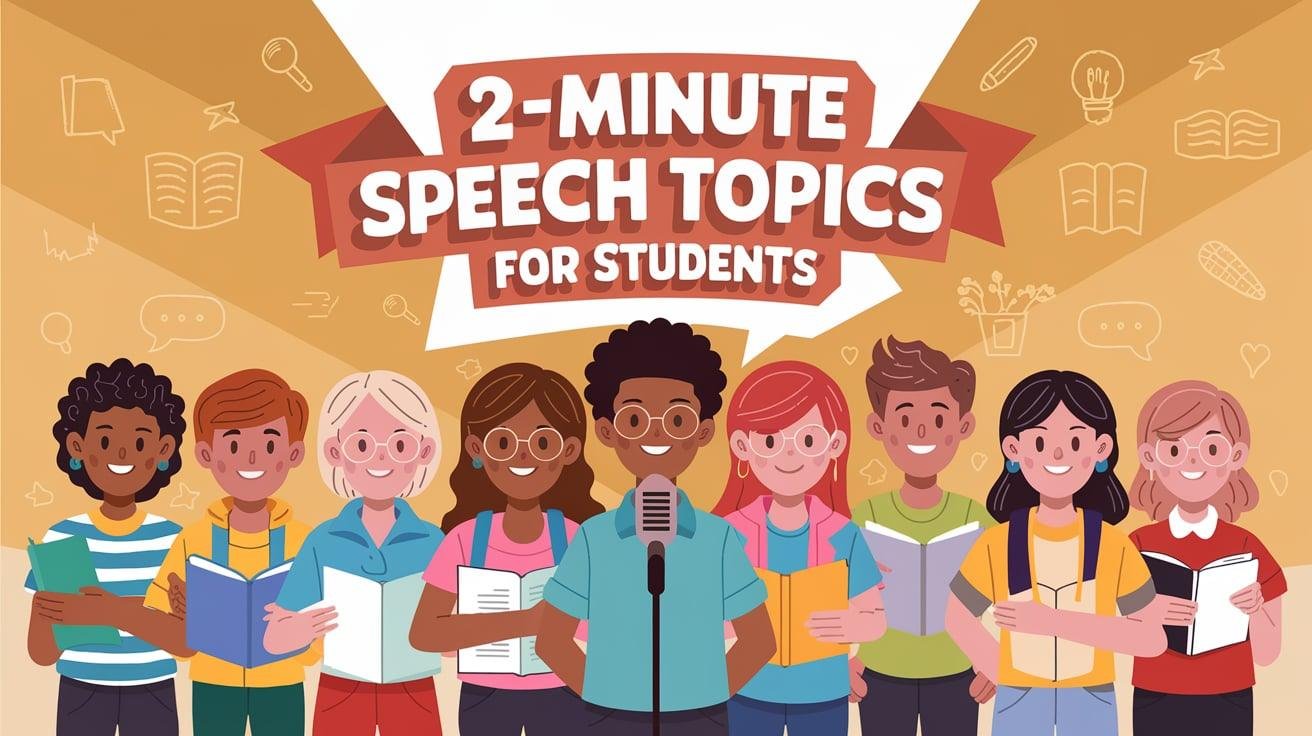A 2-minute speech is a concise yet impactful format for effectively communicating ideas within a limited timeframe. These short speeches are essential in educational settings, helping students articulate their thoughts clearly and convey complex concepts succinctly. Mastering 2-minute speech topics enhances students’ communication skills, which benefits them both academically and personally.

In today’s fast-paced world, where attention spans are shorter, learning to present ideas quickly is invaluable. Students who engage in 2-minute speeches learn to prioritize main points, cut out unnecessary details, and keep their audience interested. This skill promotes critical thinking and organization, enabling students to distill arguments to their core. Additionally, it serves as a stepping stone to more extensive presentations, building a foundation for future public speaking endeavors.
Moreover, 2-minute speeches foster confidence. Practicing these speeches helps students grow comfortable speaking in front of others, enhancing their ability to express opinions in group projects, discussions, and even future job interviews. Ultimately, these short speeches encourage an environment of open communication, helping students showcase their knowledge while developing mutual respect and engagement.
Why Choosing the Right Topic Matters for 2-Minute Speeches
Selecting the right 2-minute speech topic is key to a memorable presentation. A well-chosen topic captivates the audience, builds a connection, and fosters engagement. When a student is genuinely interested in their topic, their enthusiasm can be contagious, drawing the audience in. This emotional investment results in a dynamic delivery and enhances the speech’s impact.
Choosing a topic that reflects the speaker’s interests increases their confidence. Familiarity with the subject makes for a smoother, more natural presentation, which avoids pauses and uncertainty, keeping the audience engaged. The right topic resonates with the listeners, aligning with their interests and experiences. This connection leads to active listening and creates a lasting impression. Clearly, a well-chosen topic is critical to the success of any 2-minute speech for students.
Engaging 2-Minute Speech Topics from Personal Experiences
For students, sharing personal experiences can create some of the best 2-minute speech topics. Personal anecdotes offer a unique perspective, conveying meaningful life lessons that resonate with audiences. Stories of overcoming challenges, achieving a goal, or learning valuable lessons can create an impactful, memorable speech that stays with listeners.

One excellent 2-minute speech topic might involve a life lesson learned during a difficult time, such as facing setbacks in sports, academics, or relationships. These narratives foster shared understanding, highlighting resilience and determination, and can inspire peers to think about their own experiences. Another relatable speech topic could be a memorable event like a family gathering or trip, where lessons learned or bonds formed contributed to growth. This approach makes the speech informative and relatable, as the audience can visualize and connect with the experience.
Even light-hearted, humorous topics—such as sharing an embarrassing moment—can serve as great 2-minute speech topics for students, adding comic relief while emphasizing the value of humility and resilience. Choosing personal experiences as speech topics helps students craft engaging, insightful speeches that captivate their peers and leave a lasting impression.
Current Events and Issues for 2-Minute Speeches
Staying informed about current events opens a wealth of possibilities for engaging 2-minute speech topics. Issues such as social justice, environmental sustainability, and global health are ideal choices, encouraging students to explore real-world topics that shape their communities. Addressing timely issues like climate action or racial equality not only raises awareness but also fosters critical thinking.
Social justice topics, such as gender equality or marginalized communities’ rights, inspire empathy and understanding, encouraging students to see the value in advocacy. Additionally, by exploring case studies and global examples, students gain nuanced perspectives vital for personal development.
Environmental issues—such as climate change, pollution, and sustainability—are also popular choices for 2-minute speech topics for students. Discussing the local impact of global environmental concerns motivates students to think about their own responsibilities and to develop sustainable practices. By staying informed on current events, students learn to engage with the world around them and improve their public speaking skills while making a meaningful impact.
Hobbies and Personal Interests as Speech Topics
Drawing on hobbies and personal interests can lead to some of the most compelling 2-minute speech topics for students. A speech about a favorite pastime, whether it’s painting, sports, or playing an instrument, naturally brings enthusiasm to the presentation. Reflecting on a hobby allows students to share their journey, the challenges faced, and the personal growth achieved.
Choosing a hobby as a topic allows students to inform and inspire their peers. For instance, describing the challenges of learning a skill or achieving a milestone illustrates resilience and creativity. They could also perform a quick demonstration, sparking curiosity and enhancing audience engagement.
By selecting 2-minute speech topics grounded in personal passion, students create a lasting connection with their audience, fostering shared enthusiasm and inspiring listeners to explore their interests.
Adding Humor to 2-Minute Speeches
Adding humor to 2-minute speeches enhances their impact, making the experience enjoyable for both the speaker and the audience. A well-placed joke or light-hearted remark establishes rapport and helps to create a relaxed atmosphere. Light-hearted topics, such as funny personal stories, everyday observations, or amusing cultural references, are ideal for short speeches.
Effective timing and delivery are crucial to incorporating humor. Pauses for comedic effect and varying tone and pace keep the audience engaged. Maintaining relatable content ensures the humor resonates, while steering clear of controversial topics promotes inclusivity and positive reception. Humor transforms a simple speech into a memorable experience, leaving a lasting impression on all who listen.
Creative and Unconventional 2-Minute Speech Topics
Choosing unique or unconventional 2-minute speech topics can set a speaker apart, encouraging deeper connections with the audience. Creative topics like the science of lucid dreaming or theories on time travel intrigue listeners and stimulate imaginative thinking.
Another interesting approach could be discussing the hidden histories of everyday objects, such as light bulbs or forks, or exploring unconventional themes like “The Art of Procrastination.” Creative topics stand out and invite thought-provoking discussions, allowing students to showcase their unique perspectives and enhance their communication skills.
Tips for Preparing and Structuring a 2-Minute Speech
Effective 2-minute speech topics for students benefit from a structured approach. Start with a captivating introduction, such as a question, anecdote, or surprising fact, to grab attention. Focus on a single main point supported by two or three key points to ensure clarity. Finally, end with a memorable conclusion, such as a call to action or quote, that reinforces the main idea.

Rehearsal is crucial for timing and delivery. Practicing in front of friends, family, or even a mirror helps to refine pacing and gain feedback. Using a timer ensures the speech meets the two-minute mark, creating a concise yet impactful presentation.
Tips for Preparing and Structuring a 2-Minute Speech
Managing Speech Anxiety
Public speaking often brings anxiety, but with the right strategies, students can build confidence. Visualization, breathing exercises, and rehearsal all help manage nerves. Students can visualize delivering a successful speech, reducing anxiety and improving performance. Practicing deep breathing can promote calmness, while regular rehearsal familiarizes them with the content, enhancing comfort in front of an audience.
By embracing these techniques, students can develop the confidence needed to deliver effective 2-minute speeches, transforming public speaking into an enjoyable and rewarding experience.
Whether drawing from personal experiences, current events, or hobbies, these 2-minute speech topics for students provide an excellent foundation for engaging, impactful presentations. With the right preparation and topic selection, students can captivate their audiences and boost their communication skills, setting themselves up for future success.
Building Confidence with Rehearsal and Feedback for 2-Minute Speeches
For students aiming to excel in 2-minute speech topics, consistent practice is essential. Rehearsing multiple times helps students get comfortable with both the structure and timing of their speech. Practicing with a mirror or recording a video allows them to observe their body language and facial expressions, helping to create a confident and engaging presence.
Feedback from peers, family, or teachers can provide invaluable insights into areas for improvement. Constructive feedback allows students to refine their delivery, improve clarity, and ensure their message resonates. Practicing in front of small, supportive groups can also help students ease into public speaking, gradually reducing nerves.
By incorporating regular rehearsal and feedback, students can not only improve their speech content but also build the confidence to deliver 2-minute speeches with poise and enthusiasm.
Preparing for Different Audience Types
The success of a 2-minute speech can vary greatly depending on the audience. For students, tailoring speech topics to match their audience’s interests, age, and background is crucial. For example, a light-hearted, humorous topic may resonate well with peers, while a current events topic may be more impactful in an academic setting. By considering what might be relevant or engaging to a specific audience, students can ensure their message lands effectively.
If the audience is diverse or unfamiliar, choosing universal themes—such as resilience, creativity, or humor—can increase relatability. Observing the audience’s reactions throughout the speech can also help speakers adapt on the spot, maintaining audience engagement and making the speech more interactive.
Utilizing Visual Aids and Props to Enhance Engagement
Using visual aids can add depth and interest to a 2-minute speech. Simple props or slides with visuals related to the topic can help reinforce key points and maintain the audience’s attention. For instance, if a student is discussing environmental issues, showing an image of a polluted area or a graph depicting climate change impacts can make the topic more tangible and impactful.
However, it’s essential to keep visuals simple and relevant; too many can distract rather than enhance. Effective props are those that underscore the speaker’s message and leave a lasting impression without overshadowing the speech. When used sparingly and strategically, visual aids can help students make their 2-minute speech topics more engaging and memorable.
Embracing Storytelling for Memorable 2-Minute Speeches
Storytelling is a powerful tool for any public speaker, and it’s particularly effective for short speeches. Even within a 2-minute timeframe, weaving in a brief story or anecdote can make a topic more engaging. Stories offer a natural flow that captures attention and makes the message memorable. They also help personalize the speech, showing the speaker’s perspective and encouraging empathy from the audience.
For students, using storytelling as a technique can make their speech topics more relatable. A personal success story, an instance of overcoming challenges, or even a funny memory provides listeners with a reason to connect emotionally. Choosing 2-minute speech topics that lend themselves to storytelling makes for a presentation that is not only informative but also impactful.
Importance of Active Listening in Speech Preparation
Active listening is another valuable skill that enhances public speaking. By observing how others deliver speeches on similar topics, students can learn about effective strategies, body language, and techniques that work well with different types of audiences. Watching other speeches, either by peers or professionals, can provide inspiration for their own 2-minute speech topics. It can also help students understand what keeps an audience engaged and what might cause listeners to lose interest.
Listening closely to feedback after practice sessions is also essential for refining the speech. Incorporating advice from trusted sources allows students to gain new insights into their delivery, ultimately making them more adaptable and improving the impact of their 2-minute speeches.
Concluding Remarks on 2-Minute Speech Topics for Students
Mastering 2-minute speech topics equips students with lifelong communication skills. These short, impactful speeches not only build confidence but also hone critical thinking, organization, and adaptability. By selecting engaging topics, practicing effectively, and incorporating techniques like storytelling, visual aids, and humor, students can create presentations that captivate and inform.
Whether drawing on personal experiences, discussing current events, or showcasing personal interests, each speech is an opportunity to connect with the audience and communicate ideas with clarity and passion. As students grow more comfortable with these techniques, they develop a valuable skill set that will benefit them in academic, professional, and personal settings for years to come.
FAQ for your post on 2-minute speech topics for students
1. What are some good 2-minute speech topics for students?
Good 2-minute speech topics for students include personal experiences, current events, hobbies, environmental issues, and inspiring stories. Topics like overcoming challenges, favorite activities, or humorous life lessons can make short speeches engaging and relatable.
2. How can I make my 2-minute speech interesting?
To make a 2-minute speech interesting, start with an attention-grabbing opener, focus on one main idea, and use simple language. Adding a personal story, humor, or a quick visual aid can enhance engagement and leave a lasting impression.
3. Why is practicing 2-minute speeches beneficial for students?
Practicing 2-minute speeches helps students improve their public speaking skills, build confidence, and learn to convey ideas clearly and concisely. This skill is valuable for presentations, group discussions, and interviews.
4. How do I choose the right topic for a 2-minute speech?
Choose a topic that interests you and resonates with your audience. Personal experiences, relevant social issues, and topics you’re passionate about are often good choices, as they allow for a more authentic and engaging presentation.
5. How can students overcome nervousness when giving a short speech?
Students can overcome speech anxiety by practicing deep breathing, visualizing success, rehearsing their speech multiple times, and focusing on their main message rather than perfection. Starting with familiar topics also helps build confidence.


![भारतीय मौसम विज्ञान विभाग (IMD): मौसम पूर्वानुमान, चेतावनी प्रणाली और जलवायु रिपोर्ट 2026 [पूर्ण जानकारी]](https://marathibanna.com/wp-content/uploads/2026/01/भारतीय-मौसम-विज्ञान-विभाग-IMD.webp)




